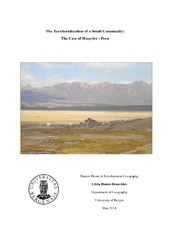The Territorialization of a small community - The case of Huaytire, Peru
Master thesis
Permanent lenke
https://hdl.handle.net/1956/7993Utgivelsesdato
2014-05-15Metadata
Vis full innførselSamlinger
- Department of Geography [634]
Sammendrag
This study explores the diverse strategies used in order to territorialize the small community of Huaytire. By focusing on this territorialization process, it is analyzed the characteristics and functions behind the implementation of territorial behaviors. Also, it is presented how a combination of strategies can create territorial conflicts. To achieve those goals, semi-structured interviews were conducted in Peru, as a data gathering technique. Territoriality as the manifestation of control or influence over a geographical space will try to organize and differentiate territories. Boundaries are commonly used for these fragmentation purposes. Due to their social nature, boundaries can be contested at any time based on a series of historical, economical, among other arguments. When this happens, territorial conflicts can be shaped, provided that the context allows it. This premise becomes the proposed theoretical framework to understand the Huaytire events. Huaytire, in 2007, witnessed a mobilization caused by an informal annexation petition. The visitors (Regional Government of Moquegua) were accused of crossing the regional boundary into Tacna's territory. This event triggered the execution of a series of territorial behaviors in order to gain or maintain the ownership of the town's territory. Both regional governments directed their actions to the local and national scale. One specific territorial strategy was presented as a territorial claim based on historical and legal arguments which in turn shaped the Huaytire territorial conflict. Through the analysis of this case study, it has been possible to understand that several actions can be taken as territorializing strategies. Furthermore, these territorial behaviors are applied in accordance to the listeners and the locality to which they are aiming to influence.
